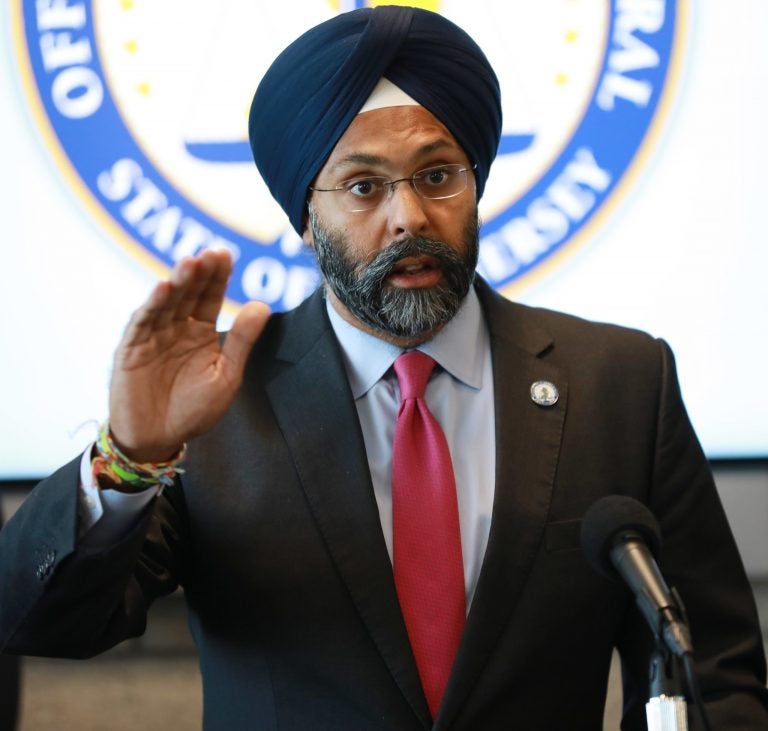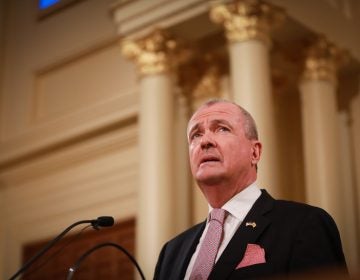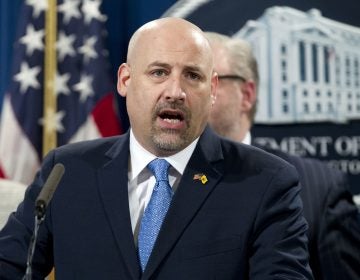Grewal blocks two N.J. counties from having immigration enforcement agreements with ICE
The directive signed Friday will effectively block New Jersey counties from entering into or maintaining 287(g) agreements, which train local police in immigration law.

New Jersey Attorney General Gurbir Grewal holds a press conference in Newark, N.J. on Friday, Sept. 27, 2019. (Office of the Attorney General/Tim Larsen)
New Jersey Attorney General Gurbir Grewal said Friday that he would bar any local law enforcement agencies from having formal agreements with U.S. Immigration and Customs Enforcement, known as ICE.
Grewal said any association with the Trump administration and its heightened focus on enforcing immigration laws would make it less likely that crime victims or witnesses would talk to police.
“We know that that doubt still exists, despite our best efforts, particularly in this moment where there’s overzealous enforcement of our country’s immigration laws,” Grewal said at a press conference in Newark.
“Our job here is to enforce our state’s criminal laws. Their job is to enforce federal immigration laws. They should do their jobs. We’ll do our jobs,” he added.
The directive signed Friday will effectively block counties from entering into or maintaining 287(g) agreements, which train local police in immigration law and give them some enforcement powers.
The Cape May County Sheriff’s Office and the Monmouth County Sheriff’s Office are the only two agencies in New Jersey with active 287(g) agreements.
“We have been trying to work with the State because I believe this program is vital to the protection of our County residents and visitors. I have never been told in my 35 years in law enforcement not to work with another law enforcement agency,” said Cape May County Sheriff Robert Nolan. He added that the county intends to go to court over the new directive.
“Law enforcement throughout Monmouth County never wants to be faced with a situation where a dangerous, undocumented immigrant is released from jail and poses a threat to a community,” said Sheriff Shaun Golden, who also threatened legal action. “However, this sanctuary directive will make our communities less safe, since it places people in those communities at risk for increased violence.”
The directive expanded on a more comprehensive one signed by Grewal last year called the Immigrant Trust Directive, which limited the state’s cooperation with federal immigration authorities.
Yet Grewal stressed Friday that neither directive prohibits local or county officers from informing federal officials of detainees held for serious crimes, and he batted away any criticism that he was providing “sanctuary” to criminals.
“We are the ones who are going out there and investigating violations of state law, whatever the crime may be. We are the ones who are then prosecuting them in court. We are the ones who need the victims and witnesses to come forward and provide us the information necessary to prosecute those people,” Grewal said.
This is not the first time the attorney general has tangled with counties over his stance on immigration enforcement. Earlier this month, Ocean County sued the state of New Jersey and Grewal, claiming last year’s Immigrant Trust Directive exceeded the state’s authority and should be overturned.
Grewal’s action came the same week ICE arrested 54 immigrants, some with a history of criminal charges, in a five-day sweep in New Jersey. ICE criticized local leaders for releasing some of those rounded up from local jails instead of handing them over to immigration officials.
WHYY is your source for fact-based, in-depth journalism and information. As a nonprofit organization, we rely on financial support from readers like you. Please give today.




